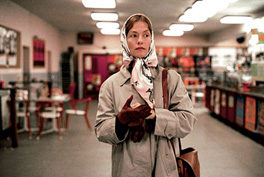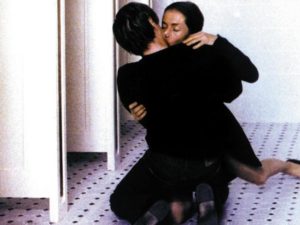STUDIO: Criterion | DIRECTOR: Michael Haneke | CAST: Isabelle Huppert, Benoit Magimel, Annie Girardot, Susanne Lothar, Udo Samel
RELEASE DATE: 9/26/17 | PRICE: DVD $19.95, Blu-ray $25.95
BONUSES: New interviews with Isabelle Huppert and Michael Haneke, scene-specific audio commentary by Huppert, and video of a dubbing session.
SPECS: NR | 130 min. | Foreign language drama | 1.85:1 widescreen | 5.1 surround | French and German with English subtitles
A-list American actresses would never be seen in a grim, unflinching character study like The Piano Teacher. Many European stars challenge themselves in their work, but the A-lister who takes the most chances on a project to project basis is most certainly Isabelle Huppert (Elle, Merci Pour le Chocolat).
The character she plays in this 2001 arthouse hit is a caustic, perfectionist piano teacher who hides several secrets — her s&m fantasies of being tortured by a lover, her self-loathing (manifested in cutting episodes), and her consumption of hardcore pornography.
Filmmaker Michael Haneke, he of the deeply troubling Benny’s Video and Funny Games and the more sympathetic Amour, sketches his lead character Erika (Huppert) as an individual for whom control is everything, professionally and in interpersonal relationships, except for the one with her domineering yet coddling mother (played by the late, great Annie Girardot).
 Erika’s stubborn facade is eroded by a piano student, Walter (Benoit Magimel, La Demoiselle d’Honneur), who sets about seducing her, and to whom she eventually reveals her s&m fantasies. He is revolted and responds to her fantasies with violence that destroys her self-image and threatens to wreck her career.
Erika’s stubborn facade is eroded by a piano student, Walter (Benoit Magimel, La Demoiselle d’Honneur), who sets about seducing her, and to whom she eventually reveals her s&m fantasies. He is revolted and responds to her fantasies with violence that destroys her self-image and threatens to wreck her career.
The Piano Teacher is a film one wants to look away from, because of the cruelty it depicts. It is also compellingly watchable because of Huppert’s impeccable performance and the way that Haneke underscores it with many lengthy close-ups of her. Erika’s anguish is clearly communicated, as well as the inevitable shift in control from her to Walter.
Huppert doesn’t shrink from playing abrasive characters, and the most striking aspect about Erika is that she is simultaneously mean and unforgiving with her students and yet still sympathetic. It’s a bravura performance, and one for which she received the Best Actress award at Cannes. Magimel also won Best Actor and Haneke won the Grand Jury Prize.
The film’s plot is thoroughly comprehensible but some of Erika’s motivations might be deemed a bit murky. It is thus invaluable to have supplements in which Huppert and Haneke speak at length. (Magimel is not on hand in any capacity.)
A new short on-camera interview with Huppert finds her calling The Piano Teacher “a great film and important one for me.” She discusses how she reconnected with playing the piano, as she studied it regularly from ages 4 to 15. She describes Erika as someone who “directs” her students and believes she can direct Walter. She also discusses the way that Haneke “finds the frame” while filming, frequently consulting the video-assist to shift the framing and create a more resonant image.
A new interview with Haneke covers a lot of ground. Firstly, the filmmaker willingly declares that he considers his films “obscene” as they are “difficult to bear and awkward to watch.”
He notes that The Piano Teacher would never have been made if Huppert didn’t want to do it, as he didn’t want to make a theatrical feature that wasn’t based on his own material. On the subject of the source material, the novel of the same name by Elfriede Jelinek, he notes that the stifling mother and daughter relationship in the film is based on Jelinek’s own life.
He eliminated much of the novel’s background into the relationship and instead created another mother and daughter in the film who serve as “reflections” of the early life of Erika and her mother.
He explores in detail the shooting of a long take that finds Erika visiting Walter as he plays hockey with his friends, and then convincing him to have sex in a storage closet. The scene is one of several in the film that depicts Erika being humiliated, since she has come to see Walter to apologize for revealing her secret fantasies to him and ends up vomiting when they have sex.
 Haneke recounts the shoot, noting that the version used was the twelfth and final take of the lengthy, edit-less scene, which involved various complicated actions. (Magimel had to remove his hockey uniform; Huppert had to conceal the “vomit” she had to expel at the end.)
Haneke recounts the shoot, noting that the version used was the twelfth and final take of the lengthy, edit-less scene, which involved various complicated actions. (Magimel had to remove his hockey uniform; Huppert had to conceal the “vomit” she had to expel at the end.)
Huppert offers similar in-depth detail in her scene-specific audio commentary, which covers 50 minutes of the film’s 130-minute running time. This supplement is unusual, in that Huppert’s comments are longer than some of the scenes in question, so the visual “loops” (in one case, we see a scene three times while she talks about it).
She is quite honest about the discomfort that Haneke’s work produces in the viewer, saying that he likes “to provoke the most intense and unbearable emotions.” Her statement that his films contain scenes that are both “hot” and “cold” is probably the most succinct description of his work in this release.
The scene that she deems the most difficult to shoot is the disturbing moment in which Erika climbs on top of her mother in bed, trying to have sex with her. She focuses on the activity of her arm, which began to move in an odd fashion, thus making the tableau seem even more unsettling than it was in the first place.
Absent from the commentary is the anticlimactic scene in which Erika is beaten by Walter. This scene shows up, however, in the last supplement, a video of a dubbing session in which Huppert added lines and screams to that sequence.
It is most valuable, as it shows how Haneke directs his actors. It also demonstrates the penchant for sadistic violence that distinguishes several of his films, including The Piano Teacher. He instructs Huppert on how to scream and plead for mercy in a more realistic fashion, to the extent of acting out what he wants.
For her part, Huppert enters so deeply into the moment that she brushes away the video camera at one point. It remains at a respectful distance for the remainder of the session.
|
Buy or Rent The Piano Teacher
|
|---|
Leave a Reply